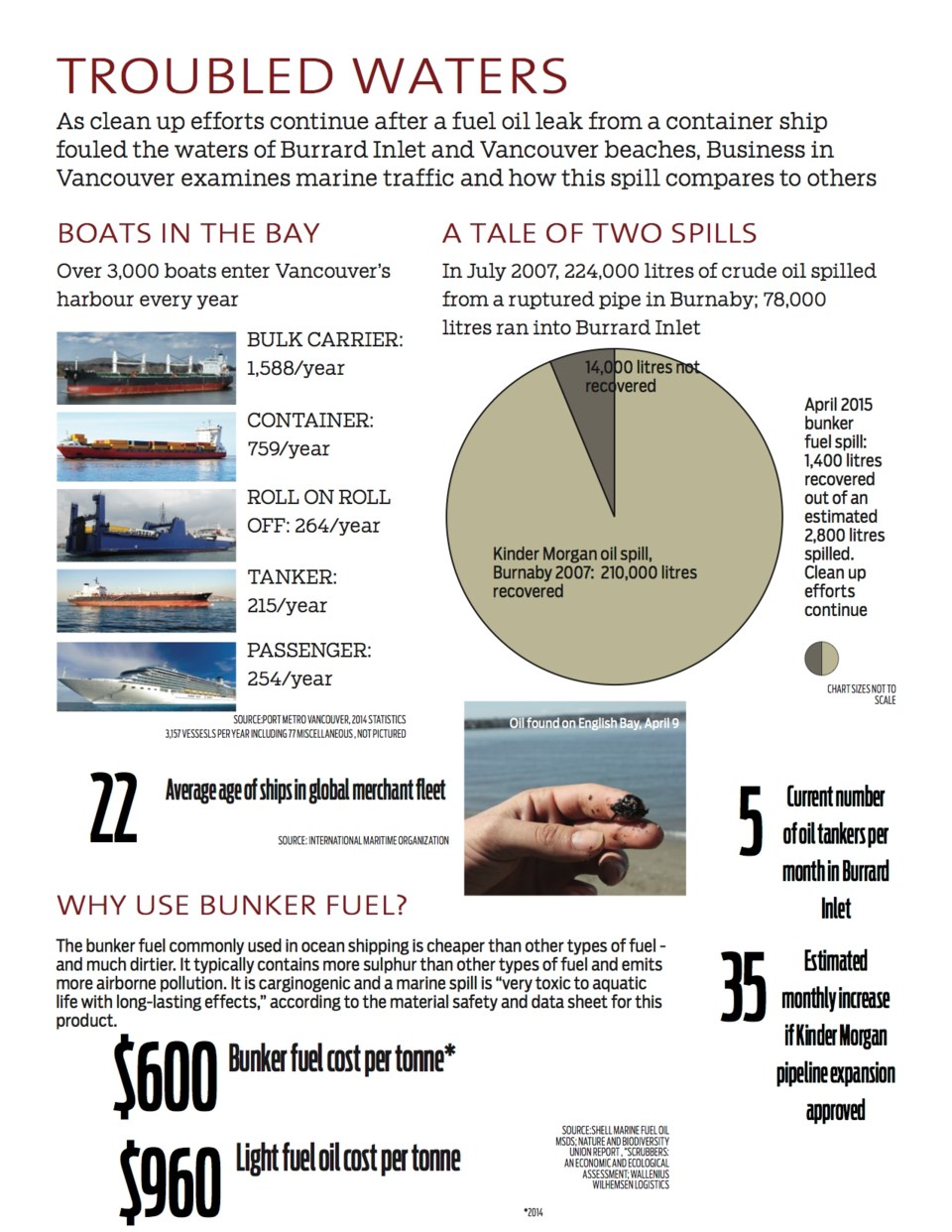Canadian Coast Guard officials insist they did their job properly to contain the MV Marathassa bunker fuel spill last week. But did the coast guard and other agencies have enough practice together to do the job efficiently?
The federal government’s Tanker Safety Panel’s November 2013 review of ship-source oil spill preparedness and response concluded there was “no comprehensive national framework” for regular multi-jurisdictional exercises to test area response plans.
“It doesn’t matter whether it’s federal, provincial or municipal, we’ve got to work all together, and we’ve got to exercise,” maritime lawyer Joe Spears told the Courier. “You need to get everyone sitting around the table, and all you see down there are [politicians] pointing fingers.”
Coast guard asst. comm. Roger Girouard said personnel were involved in a June 2014, full-scale oil spill exercise led by the U.S. Coast Guard in Bellingham, Wash., but the Canadian Coast Guard media relations office did not provide the Courier before deadline with specifics on exercises, whether table-top or full-scale, that it has led.
“We are always practising, we always invite partners to come and play, particularly to exercise incident command,” Girouard said. “The coast guard is still ramping up its expertise around.”
Western Canada Marine Response Corp. (WCMRC) spokesperson Michael Lowry said the only local Transport Canada-certified clean-up contractor held local tabletop and on-water exercises last fall. Tabletop exercises were already planned next week for Nanaimo and next month in Vancouver before the Marathassa incident.
Canada, unlike Norway, does not allow oil-on-water exercises, so WCMRC relies on Environment Canada-provided trajectory modelling based on tides and weather of the day of an exercise, Lowry said.
“Municipalities are invited, they’re stakeholders but we like to integrate them into the incident command post,” Lowry said.

He said the City of Vancouver was part of a table top exercise last September that included an on-water component. City of Vancouver’s emergency management director Daniel Stevens did not respond to the Courier and the corporate communications department declined to comment before deadline.
Meanwhile, Mayor Gregor Robertson is standing by his claim that the city was in the dark for 12 hours after the spill from the grain carrier, built in Japan and launched in January. Port Metro Vancouver issued a series of Tweets just after 1 a.m. April 9 and the Department of Fisheries and Oceans Tweeted April 10 that it “directly contacted Vancouver City Police to inform them of the spill” at 9:54 p.m. April 8.
“Our information is that the call you are referencing was a 911 call and not a notification to the City of Vancouver about a major oil spill near our shores,” said mayor’s office spokesman Braeden Caley.
City manager Penny Ballem told council on April 14 that “the call VPD got was actually a question to them.” She said WCMRC notified the city at 5:06 a.m. and the emergency operations centre was activated at 5:50 a.m.
Girouard conceded communications among agencies “did not go as well as it should,” and said “the alarm bell did not make it particularly to the mayor of Vancouver.”
Coast guard said it was notified at 5:10 p.m. on April 8 by municipal emergency services that a recreational boater noticed a slick around Marathassa. By 5:14 p.m., it “informed emergency management partners of the incident in accordance with recognized protocols, which inform local, shore-side authorities such as municipal governments and First Nations.”
The province’s Emergency Coordination Centre said it received a spill report from the coast guard at 5:22 p.m. and notified the Environment Ministry at 5:27 p.m.
Port Metro Vancouver confirmed the sheen at 5:38 p.m. The coast guard said it told WCMRC at 6:08 p.m. to stand by. The company was activated at 8:06 p.m. and on-scene at 9:25 p.m. The boom was around the vessel by 5:33 a.m. April 9, the coast guard said.
The coast guard, however, admitted that it failed to issue an official notice to mariners about the incident until 6:28 a.m. April 9. By then, there had been an evening high tide and morning low tide in English Bay.
“I can’t tell you why it took until six in the morning,” Girouard said. “What I can tell you is that the waterway was controlled in a safe manner that allowed the operation to be conducted.”
[email protected]
twitter.com/bobmackin


